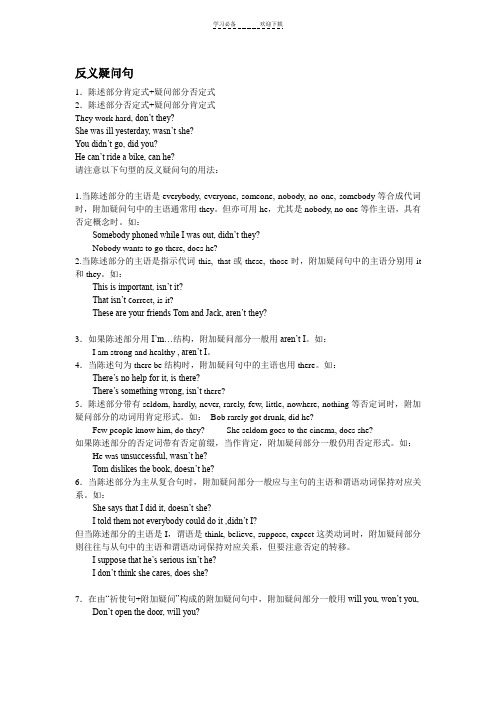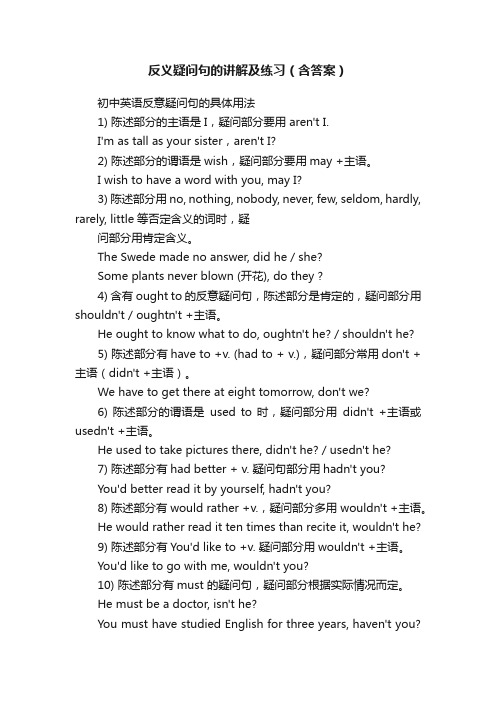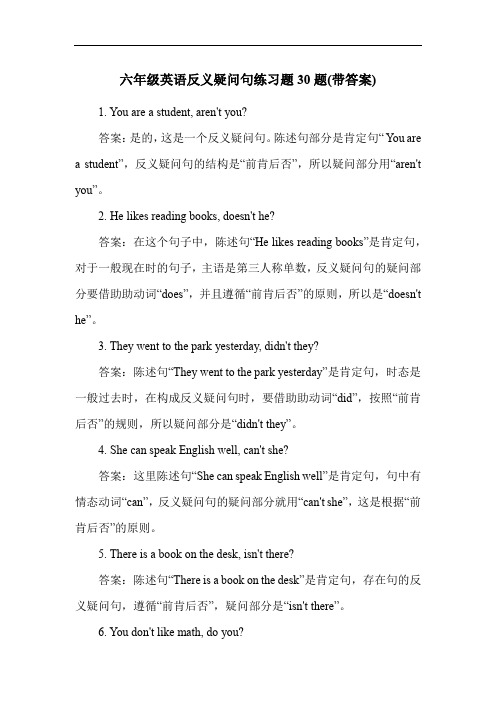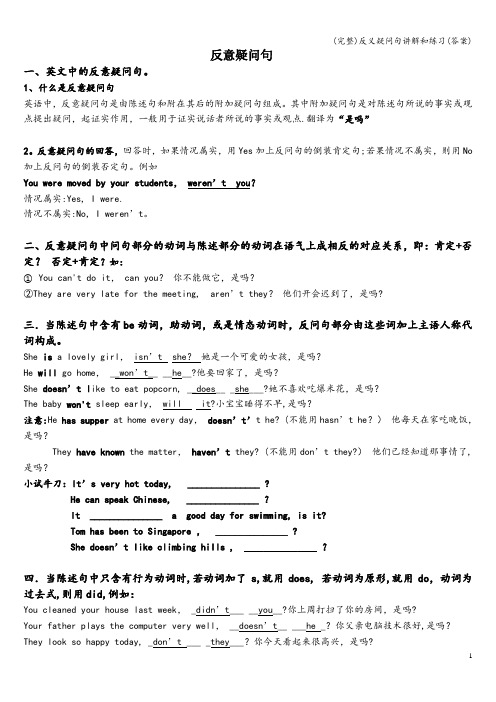反义疑问句练习题及答案讲解
反义疑问句详解及练习和答案

反义疑问句1.陈述部分肯定式+疑问部分否定式2.陈述部分否定式+疑问部分肯定式They work hard, don’t they?She was ill yesterday, wasn’t she?You didn’t go, did you?He can’t ride a bike, can he?请注意以下句型的反义疑问句的用法:1.当陈述部分的主语是everybody, everyone, someone, nobody, no one, somebody等合成代词时,附加疑问句中的主语通常用they。
但亦可用he,尤其是nobody, no one等作主语,具有否定概念时。
如:Somebody phoned while I was out, didn’t they?Nobody wants to go there, does he?2.当陈述部分的主语是指示代词this, that或these, those时,附加疑问句中的主语分别用it 和they。
如:This is important, isn’t it?That isn’t c orrect, is it?These are your friends Tom and Jack, aren’t they?3.如果陈述部分用I’m…结构,附加疑问部分一般用aren’t I。
如:I am strong and healthy , aren’t I。
4.当陈述句为there be结构时,附加疑问句中的主语也用there。
如:There’s no help for it, is there?There’s something wrong, isn’t there?5.陈述部分带有seldom, hardly, never, rarely, few, little, nowhere, nothing等否定词时,附加疑问部分的动词用肯定形式。
反义疑问句的讲解及练习(含答案)

反义疑问句的讲解及练习(含答案)初中英语反意疑问句的具体用法1) 陈述部分的主语是I,疑问部分要用 aren't I.I'm as tall as your sister,aren't I?2) 陈述部分的谓语是wish,疑问部分要用may +主语。
I wish to have a word with you, may I?3) 陈述部分用 no, nothing, nobody, never, few, seldom, hardly, rarely, little等否定含义的词时,疑问部分用肯定含义。
The Swede made no answer, did he / she?Some plants never blown (开花), do they ?4) 含有ought to 的反意疑问句,陈述部分是肯定的,疑问部分用shouldn't / oughtn't +主语。
He ought to know what to do, oughtn't he? / shouldn't he?5) 陈述部分有have to +v. (had to + v.),疑问部分常用don't +主语(didn't +主语)。
We have to get there at eight tomorrow, don't we?6) 陈述部分的谓语是used to 时,疑问部分用didn't +主语或usedn't +主语。
He used to take pictures there, didn't he? / usedn't he?7) 陈述部分有had better + v. 疑问句部分用hadn't you?You'd better read it by yourself, hadn't you?8) 陈述部分有would rather +v.,疑问部分多用 wouldn't +主语。
六年级英语反义疑问句练习题30题(带答案)

六年级英语反义疑问句练习题30题(带答案)1. You are a student, aren't you?答案:是的,这是一个反义疑问句。
陈述句部分是肯定句“ You are a student”,反义疑问句的结构是“前肯后否”,所以疑问部分用“aren't you”。
2. He likes reading books, doesn't he?答案:在这个句子中,陈述句“He likes reading books”是肯定句,对于一般现在时的句子,主语是第三人称单数,反义疑问句的疑问部分要借助助动词“does”,并且遵循“前肯后否”的原则,所以是“doesn't he”。
3. They went to the park yesterday, didn't they?答案:陈述句“They went to the park yesterday”是肯定句,时态是一般过去时,在构成反义疑问句时,要借助助动词“did”,按照“前肯后否”的规则,所以疑问部分是“didn't they”。
4. She can speak English well, can't she?答案:这里陈述句“She can speak English well”是肯定句,句中有情态动词“can”,反义疑问句的疑问部分就用“can't she”,这是根据“前肯后否”的原则。
5. There is a book on the desk, isn't there?答案:陈述句“There is a book on the desk”是肯定句,存在句的反义疑问句,遵循“前肯后否”,疑问部分是“isn't there”。
6. You don't like math, do you?答案:陈述句“You don't like math”是否定句,反义疑问句的结构是“前否后肯”,所以疑问部分是“do you”。
四年级英语反义疑问句练习题30题(答案解析)

四年级英语反义疑问句练习题30题(答案解析)1. You are a student, aren't you?答案解析:这是一个be动词(are)引导的反义疑问句。
反义疑问句的构成规则是:前半句是肯定陈述句,后半句则用否定的简短问句。
前半句“You are a student”是肯定句,所以后半句用“aren't you”。
2. He is a good boy, isn't he?答案解析:此题为be动词(is)引导的反义疑问句。
根据规则,前句为肯定陈述,后句要用否定疑问形式。
这里前半句“He is a good boy”是肯定的,所以后面是“isn't he”。
3. She was at school yesterday, wasn't she?答案解析:这是be动词((was)引导的反义疑问句。
由于前半句“She was at school yesterday”是肯定句,反义疑问句的后半句就要用否定形式“wasn't she”,这是遵循前肯后否的原则。
4. They like apples, don't they?答案解析:这里是助动词((do)引导的反义疑问句。
因为前半句“They like apples”是一般现在时的肯定陈述句,且句中的动词“like”是实义动词,所以反义疑问句的后半句要用助动词do的否定形式“don't they”。
5. We have a new book, don't we?答案解析:这是助动词((do)引导的反义疑问句。
前半句“We have a new book”是一般现在时的肯定句,其中“have”在这里是实义动词,按照规则,后半句要用助动词do的否定形式“don't we”。
6. Tom can swim, can't he?答案解析:这是情态动词((can)引导的反义疑问句。
四年级英语反义疑问句练习题30题带答案

四年级英语反义疑问句练习题30题带答案1. He is a student, isn't he?答案:是。
解析:在这个反义疑问句中,前面的陈述部分“He is a student”是肯定句,根据反义疑问句的规则,肯定句后面的疑问部分要用否定形式,所以是“isn't he”。
这里be动词是is,疑问部分就将is变为否定形式isn't,然后加上主语he。
2. She is happy, isn't she?答案:是。
解析:陈述部分“She is happy”为肯定句,按照规则,反义疑问句的疑问部分要用否定形式。
be动词是is,否定形式为isn't,再加上主语she。
3. It is a cat, isn't it?答案:是。
解析:前面陈述部分“It is a cat”是肯定句,对于这种以be动词is构成的肯定句,反义疑问句的疑问部分为否定形式,即把is变为isn't,再加上主语it。
4. You are a good boy, aren't you?答案:是。
解析:陈述部分“You are a good boy”是肯定句,由于be动词是are,所以反义疑问句的疑问部分为否定形式aren't,再加上主语you。
5. They are at home, aren't they?答案:是。
解析:陈述部分“They are at home”是肯定句,be动词为are,根据反义疑问句的规则,疑问部分为否定形式aren't,再加上主语they。
6. He is my father, isn't he?答案:是。
解析:陈述部分“He is my father”为肯定句,be动词是is,反义疑问句的疑问部分为否定形式isn't,再加上主语he。
7. She is in the classroom, isn't she?答案:是。
反义疑问句练习题及答案解析

反义疑问句练习题及答案解析反义疑问句是英语语法中的一种问句形式,用于在表达某种观点或态度时,征求对方的认同或否认。
反义疑问句通常由两个部分组成,主句和从句,其中主句陈述事实,并以逗号结尾,从句是对主句的反问。
以下是一些反义疑问句的练题及答案解析:1. He is a doctor, isn't he?答案:是解析:句子的主语是 "He",陈述了 "He" 是一个医生。
主句以逗号结尾,从句表达了 "He" 是一个医生这一观点,并征求对方的认同。
2. They don't like coffee, do they?答案:否解析:句子的主语是 "They",陈述了 "They" 不喜欢咖啡。
主句以逗号结尾,从句表达了 "They" 不喜欢咖啡这一观点,并征求对方的否认。
3. You can swim, can't you?答案:是解析:句子的主语是 "You",陈述了 "You" 能游泳。
主句以逗号结尾,从句表达了 "You" 能游泳这一观点,并征求对方的认同。
4. She hasn't finished her homework, has she?答案:否解析:句子的主语是"She",陈述了"She" 没有完成她的作业。
主句以逗号结尾,从句表达了 "She" 没有完成她的作业这一观点,并征求对方的否认。
5. He won't be late, will he?答案:否解析:句子的主语是 "He",陈述了 "He" 不会迟到。
主句以逗号结尾,从句表达了"He" 不会迟到这一观点,并征求对方的否认。
(完整)反义疑问句讲解和练习(答案)

反意疑问句一、英文中的反意疑问句。
1、什么是反意疑问句英语中,反意疑问句是由陈述句和附在其后的附加疑问句组成。
其中附加疑问句是对陈述句所说的事实或观点提出疑问,起证实作用,一般用于证实说话者所说的事实或观点.翻译为“是吗”2。
反意疑问句的回答,回答时,如果情况属实,用Yes加上反问句的倒装肯定句;若果情况不属实,则用No 加上反问句的倒装否定句。
例如You were moved by your students,weren’t you?情况属实:Yes, I were.情况不属实:No, I weren’t。
二、反意疑问句中问句部分的动词与陈述部分的动词在语气上成相反的对应关系,即:肯定+否定?否定+肯定?如:①You can't do it, can you?你不能做它,是吗?②They are very late for the meeting, aren’t they?他们开会迟到了,是吗?三.当陈述句中含有be动词,助动词,或是情态动词时,反问句部分由这些词加上主语人称代词构成。
She is a lovely girl,isn’t she?她是一个可爱的女孩,是吗?He will go home, __won’t__ __he__?他要回家了,是吗?She doesn’t l ike to eat popcorn, __does__ _she___?她不喜欢吃爆米花,是吗?The baby won't sleep early, will it?小宝宝睡得不早,是吗?注意:He has supper at home every day,doesn’t’t he? (不能用hasn’t he?)他每天在家吃晚饭,是吗?They have known the matter,haven’t they? (不能用don’t they?)他们已经知道那事情了,是吗?小试牛刀:It’s very hot today, _______________ ?He can speak Chinese, _______________ ?It _______________ a good day for swimming, is it?Tom has been to Singapore , _______________ ?She do esn’t like climbing hills , _______________ ?四.当陈述句中只含有行为动词时,若动词加了s,就用does, 若动词为原形,就用do,动词为过去式,则用did,例如:You cleaned your house last week, _didn’t___ __you__?你上周打扫了你的房间,是吗?Your father plays the computer very well, __doesn’t__ ___he _?你父亲电脑技术很好,是吗?They look so happy today, _don’t ___ _they___?你今天看起来很高兴,是吗?小试牛刀: Meimei studies in a middle school, _______________ ?He loves cold weather , _______________ ?You finished the task yesterday, _______________ ?五.反意疑问句的陈述部分带有little, few, never, hardly, seldom,nobody, nothing,barely, scarcely等否定意义的词时,问句部分用肯定式.如:①She never tells a lie, does she?(不用doesn’t she?)她从不说谎,是吗?②He was seldom late, was he?(不用wasn’t he?) 他几乎不迟到,是吗?小试牛刀:Few students can answer the question, _______________ ?He can hardly finish his homework, _______________ ?六、反意疑问句的陈述部分为I am……时,问句部分习惯上用aren’t I?表示.如:I am a very honest man, aren’t I? 我是个很诚实的人,是吗?小试牛刀:I’m in Class 3,Grade 2, _______________ ?I’m ten years old, _______________ ?七.陈述部分的主语为不定代词something, anything, nothing, everything时,问句部分的主语用it。
中考英语反意疑问句练习题20题(答案解析)

中考英语反意疑问句练习题20题(答案解析)1.He likes playing basketball, doesn't he?A.does heB.is heC.doesn't he答案解析:C。
反意疑问句的构成规则是前肯后否,前否后肯。
本题中前面是肯定句,所以后面用否定形式doesn't he。
A 选项与前面重复,B 选项be 动词与前面不一致。
2.She is a good student, isn't she?A.is sheB.isn't sheC.are she答案解析:B。
前肯后否,前面是肯定句,后面用否定形式isn't she。
A 选项与前面重复,C 选项be 动词与前面不一致。
3.They went to the park yesterday, didn't they?A.did theyB.didn't theyC.do they答案解析:B。
前肯后否,前面是过去式的肯定句,后面用过去式的否定形式didn't they。
A 选项与前面重复,C 选项时态不一致。
4.There is a book on the table, isn't there?A.is thereB.isn't thereC.are there答案解析:B。
前肯后否,前面是there be 句型的肯定句,后面用there be 句型的否定形式isn't there。
A 选项与前面重复,C 选项be 动词与前面不一致。
5.He can swim well, can't he?A.can heB.can't heC.does he答案解析:B。
前肯后否,前面是肯定句,后面用否定形式can't he。
A 选项与前面重复,C 选项助动词与前面不一致。
6.She has a pen, doesn't she?A.does sheB.doesn't sheC.has she答案解析:B。
- 1、下载文档前请自行甄别文档内容的完整性,平台不提供额外的编辑、内容补充、找答案等附加服务。
- 2、"仅部分预览"的文档,不可在线预览部分如存在完整性等问题,可反馈申请退款(可完整预览的文档不适用该条件!)。
- 3、如文档侵犯您的权益,请联系客服反馈,我们会尽快为您处理(人工客服工作时间:9:00-18:30)。
反义疑问句练习1.Zhou Ming has few English magazines, ________?A.does heB.doesn’t heC.has heD.hasn’t he2.Cindy could hardly speak English three years ago, ________?A. couldn't she?B. could sheC. can she3.Alice had a wonderful time yesterday, _______?A. hadn’t sheB. wasn’t sheC. didn’t sheD. wouldn’t she 4.–She didn’t come to schoolyesterday, did she?–______, though she was not feeling well.A. No, she didn’tB. Yes, she didn’tC. No, she didD. Yes, she did5.---He hardly spent any time on his subjects, ________?---________, so he does badly in his lessons.A .didn’t he, Yes B. did he, Yes C. didn’t he, No D. did he, No 6.He’s read this book before, ?A. hasn’t heB. doesn’t heC. isn’t heD. wasn’t he 7.–Let’s go for a walk, ______?-- OK, I’m coming . Don’t forget to bring your camera, ______? A. will you; will you B. will you; shall weC. shall we; shall weD. shall we; will you8.John had a short walk after lunch, ________?A. did heB. didn't heC. had heD. hadn't he9.Nancy hardly rings you up, ___________?A. doesn’t sheB. does sheC. doesn’t NancyD. does Nancy 10.---Your brother often disagrees with you, _______ he ?--- _______. We often have different opinions.A.does; YesB. doesn’t ;YesC. does; NoD. doesn’t; No 11.Kate’s never late for school,?A.isn’t sheB.hasn’theC.is sheD.has she12.--- Liu Tao has never read the book The Adventure of Tom Sawyer , _______ he?--- _____. He told me it's very interesting. He'd like to read it again.A. is; No, he isn'tB. has; Yes, he hasC. isn’t; Yes, he isD. hasn’t; No, he hasn't13.—He’s never late for school, ________?—No, he isn’t .He is always very early.A. is heB. isn’t heC. hasn’t heD. has he 14.—There’s little meat left in the fridge, ________?—________. I’ll get some on my way home.A. is there, YesB. isn’t there, YesC. is there, NoD. isn’t there, No15.—Tom finished his homework, didn’t he?—__________, though he was ill yesterday.A. No, he didn’tB. Yes, he didC. Yes, he doesD. No, he doesn’t16.There is little water in the cup, ?A. is thereB. isn’t thereC. isn’t itD. is it17. He’s still not understood by his close friend although he has said sorryto him, _________?A. hasn’t heB. has heC. isn’t heD. is he18.You have never visited the place before, you?A. didB. didn’tC. haveD. haven’t19.Don't keep poison in the kitchen, _______?A. do youB. shall weC. will youD. don't you20.There are no museums in our city, _________?A. aren’t thereB. are thereC. is thereD. isn’t there21.Your father is playing the piano very well, he?A.isB.isn’tC.doesD.doesn’t22.—It’s her birthday tomorrow, ______ ?—Yes, let’s have a surprise party for her.A. isn’t itB. isn’t sheC. doesn’t itD. doesn’t she23.--- He’s never stolen anything before, _______ he?--- ________. It’s h is third time to be taken to the police station.A. hasn’t; YesB. has; NoC. has; YesD. is; No24.—It’s her birthday tomorrow, ______ ?—Yes, let’s have a surprise party for her.A. isn’t itB. isn’t sheC. doesn’t itD. doesn’t she25.-----Your father never watched the drama series on TV, __________? -----_____________________. He thinks theses drama series are boring and dull.A.does he; Yes, he does.B. does he; No, he doesn’tC. doesn’t he ; Yes, he does.D. doesn’t he ; No, he doesn’t .26.—Tom is an honest boy, _______ he?—Yes. We trust him all the time.A. isn’tB. isC. doesD. doesn’t27.Good, you’ve done it well! You need no more help from us, ______.?A. do youB. need youC. don’t youD. needn’t you28.His father had an important meeting just now, _______?A. did heB. had heC. didn't heD. hadn't he29.-- You used to be short, didn’t you?-- _______. I was the shortest in my class.A. Yes, I did.B. No, I didn’t.C. Yes, I was.D. No, I wasn’t.参考答案1.A【解析】试题分析:句意为:周明几乎没有英语杂志对吗?这是一个反义疑问句,反义疑问句的结构遵循前肯定后否定或者前否定后肯定,前后人称、时态一致的原则。
结合语境可知,few有否定意义,故应选A。
考点:考查反义疑问句。
2.B【解析】试题分析:hardly意为“几乎不”,是一个否定意义的副词,反意疑问句要遵循“前肯后否,前否后肯”的原则,句意:Cindy三年前几乎不能讲英语,不是吗?故选B。
考点:考查反意疑问句的用法。
3.C【解析】试题分析:句意:爱丽丝昨天过得很愉快,对吗?所以选C。
考点:考查反意疑问句。
【答案】D【解析】试题分析: 句意:昨天她没有来学校是吗?不,尽管她感觉不舒服,但是她还是来了。
此题考查反意疑问句,根据句意,故选D。
考点:考查反意疑问句的答语。
5.D【解析】试题分析:句意:他几乎不在功课上花费时间,是吗?是,所以他功课很差。
前面有hardly表否定,所以反义疑问句用肯定的,排除A、C,根据后面的答句说他课程学得很差,表示他几乎不学习,所以选No,表示不学习的意思。
考点: 考查反意疑问句。
6.A【解析】试题分析:句意:以前他已经读过这本书了,不是吗?因为前面的缩写代表的是has,反意疑问句,前肯定,后否定,选A。
考点:考查反意疑问句.7.D【解析】试题分析:句意:咱们去散散步,好吗?好吧,我就来。
别忘了带上你的相机,好吗?反意疑问句是英语四大问句之一,它是由一个陈述句加上一个短问句而构成的。
反意疑问句的基本构成形式是:陈述句+动词(肯定或否定)+主语?使用反意疑问句要注意以下若干对应规则:反意疑问句中问句部分的动词与陈述部分的动词在语气上成相反的对应关系,即:肯定+否定?否定+肯定?反意疑问句中问句部分的动词与陈述部分的动词种类要对应一致。
